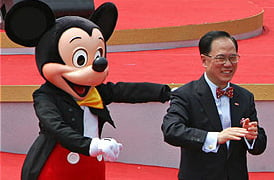Mon, 11 Sep
Christine Loh’s trouble-making Civic Exchange think tank continues its unending quest to undermine respect for the Government by producing smart-ass policy proposals. This time, it is a plan to reduce Hong Kong’s air pollution within 24 months.
As with its policy papers on the Central waterfront, the electricity industry, constitutional reform and much else, the group implicitly attacks our officials. It damages morale among civil servants by presuming that outsiders have the capability to formulate policy and the right to present such ideas to the public as if they were somehow on an equal basis with those of trained professionals. It further humiliates our hard-working and selfless Civil Service by employing such reckless methods as lateral, critical and creative thinking. This enables Civic Exchange to produce initiatives that strike many taxpayers – who don’t understand the realities like Administrative Officers do – as actually superior to those of the Government.
This is extremely disturbing. The group’s recommendations blatantly disregard the interests of various sectors, focusing instead on the well-being of the population as a whole – a recipe for unimaginable disruption to our stability and prosperity.
Mercifully, as a reassuring thud-thud noise emanating from Lower Albert Road reminds us, there is a time-honoured way to manage this threat. Like every other publication by this pesky mob of arrogant citizen-action, civil society fanatics, it will be cast with amused contempt into the nearest bin within seconds of being dropped on any bureaucrat’s desk.
Tue, 12 Sep
In recent years we have had the Pan-Pearl River Delta Regional Cooperation and Development Forum, the 2004 Hong Kong Economic Summit – Leveraging on the Mainland & Engaging Ourselves Globally, the Hong Kong/Guangdong Cooperation Joint Conference, the Closer Economic Partnership Arrangement, and too many other talking shops and symbolic institutional structures for bandwidth to accommodate. Somewhere out there, we also have a Commission on Strategic Development, which has a Committee on Economic Development and Economic Cooperation with the Mainland. And now we have the Economic Summit on China’s 11th Five-Year Plan and Development of Hong Kong, with the usual, depressingly predictable list of participants.
The common threads running through all of these events and initiatives are hand-wringing, even alarming, doubts and fears about Hong Kong’s future economic ‘positioning’, and constant mutual assurances that ‘integration’ with the Mainland will save us. There is a Gordian knot of subtexts…
- Hong Kong is a weak and worthless place whose people are dependent on the munificence of the kindly Communist regime for their future well-being. It is arrogant and disloyal to imagine that we can thrive without the help of the Motherland like we did before the British left. This is why we must ‘focus on the economy’ and not upset Beijing about political reform.
- Laissez-faire affectations are out. The Hong Kong Government now has the leading role to play in plotting our future economic course, and that role may be to beg Beijing for assistance or protection. Ability to arrange favours from the Central People’s Government, such as an ever-increasing stream of ragged Mainland tourists or creaking companies seeking IPOs, is a key requirement of local leadership. The importance of foreigners to the local economy is waning.
- We must cling to our existing strengths – financial services, tourism, the port – however tenuous some of them may be getting. Failing that, we must look to our past and see if we can go back to having a manufacturing base. Alternatively, we can consider Singapore-style planning, in which officials attempt to pick and subsidize winners in glamorous-sounding space-age tech-type industries. Under no circumstances will we make space for any new industries or players by scrapping the high land-price policy, cutting spending on unnecessary infrastructure, trimming the bloated public sector or anything else that threatens the interests of the civil service-property cartel regime.
- Mainland cities that are developing fast from their old, low bases do not despise us for being un-taxed crybabies looking for free lunches from Beijing. They do not take delight in seeing us held back economically by our frozen political structure. They take no pleasure in gaining competitive advantages in more and more of our blue-collar and white-collar activities while we stand still. They do not drool at the thought of getting their hands on our vast financial reserves in the guise of cross-border development schemes. They do not hate our guts. They love us, and if we have enough partnership, integration and cooperation, we will all live happily ever after.
When will it make sense for us all to move to Shenzhen? Some say 10 years, some say five. Maybe this latest summit will provide the answer.


How depressing similar to Sept 2010 Sept 2006 sounds
I have to disagree with oddsox – while HKG is remarkably (and depressingly) similar to what it was like in September 2006, parts of the mainland have come along way – it might indeed soon be time to move…
Put Odell in charge while you take a wee break, old chap.
With regards to the Civic Exchange think tank – personally I find its head honcho, Little Miss Goody Two Shoes, really quite nauseating.